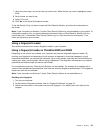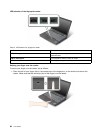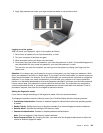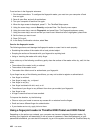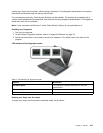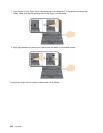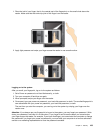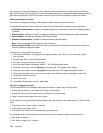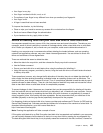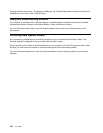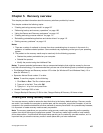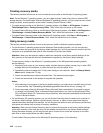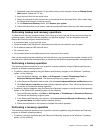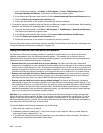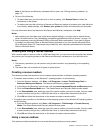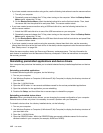
• Your nger is very dry.
• Your nger is stained with dirt, mud, or oil.
• The surface of your nger is very different from when you enrolled your ngerprint.
• Your nger is wet.
• A nger is used that has not been enrolled.
To improve the situation, try the following:
• Clean or wipe your hands to remove any excess dirt or moisture from the ngers.
• Enroll and use a different nger for authentication.
• If your hands are too dry, apply lotion to them.
Notice on deleting data from your hard disk drive or solid state drive
As computers spread into every corner of life, they process more and more information. The data on your
computer, some of which is sensitive, is stored on a storage device, either a hard disk drive or solid state
drive. Before you dispose of, sell, or hand over your computer, make sure to delete data stored on it.
Handing your computer over to someone else without deleting the loaded software, such as operating
systems and application software, may even violate License Agreements. You are advised to check the
terms and conditions of those Agreements.
There are methods that seem to delete the data:
• Move the data to the recycle bin, and then choose the Empty recycle bin command.
• Use the Delete command.
• Format your hard disk drive or solid state drive, using the software for initializing it.
• Using the recovery program, provided by Lenovo, bring the hard disk drive or the solid state drive back
to factory-ship state.
These operations, however, only change the le allocation of the data; they do not delete the data itself. In
other words, the data retrieval processing is disabled under an operating system such as Windows. The
data is still there, even though it seems to be lost. Thus, it is sometimes possible to read the data by use of
special software for data recovery. There is a risk that people of bad faith may read and misuse the critical
data on hard disk drives or solid state drives for unexpected purposes.
To prevent leakage of data, it becomes very important that you take responsibility for deleting all the data
from the hard disk drive or solid state drive when you dispose of, sell, or hand over your computer. You can
destroy the data physically by smashing the hard disk drive with a hammer, or magnetically by means of
strong magnetic power, thus making the data unreadable. But we recommend that you make use of the
software (payware) or service (pay service) specically developed for the purpose.
For disposing of data on the hard disk drive, Lenovo provides such software as PC Doctor for DOS and the
Secure Data Disposal tool. Software provides the interface for full erasure of the contents of a hard disk. To
download either application, go to the Lenovo Web site at:
http://www.lenovo.com/support
Note: Running the application will take a couple of hours.
If Encryption solid state drive or Disk Encryption hard disk drive is supported and installed in your computer,
you can logically dispose of all the data on a device in a very short time by erasing the cryptographic key.
The data encrypted with the old key is not physically erased but remains on the disk; however, it cannot be
Chapter 4. Security 105



